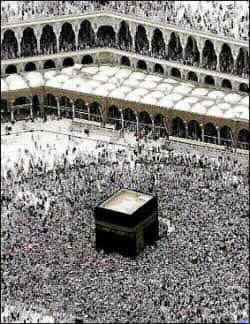The coincidence of quickening US war preparations against Iraq with the annual Muslim pilgrimage, which is expected to draw more than two million to Mecca next month, could prove explosive for key US ally Saudi Arabia, analysts warn. Orders delivered Friday for an additional 35,000 US troop to deploy to the Gulf are set to bring total US troop numbers deployed in the region to at least 75,000 by the time the pilgrimage kicks off around February 7.
And the numbers of faithful in the holy places of western Saudi Arabia are not expected to peak until February 10, just days before the mid-February US target date for war readiness long touted by Western media reports.
Turmoil around the region has resulted in deadly unrest in the holy places in the past. During the 1987 pilgrimage, 402 people died in clashes between Saudi police and Iranian pilgrims, as tensions between the conservative Gulf state and the revolutionary republic boiled over into violence.
In recent weeks Islamist websites have been filled with calls for strikes on American interests, as the US military buildup in the region has intensified.
But analysts warn that it is not just the holy places themselves that are at risk, but the rest of the kingdom, where most Western expatriates are based, as the Saudi authorities concentrate police resources on Mecca and Medina.
Saudi Arabia deployed some 80,000 security personnel to police the 1.8 million faithful who made the pilgrimage in 2002, but this year attendance is expected to rise to 2.3 million, further stretching the kingdom's resources.
"If the US invasion of Iraq coincides with the hajj, it's Saudi Arabia that will be the first to suffer," warned Mohamed al-Mesfer, politics professor at Qatar University.
"The security services will be concentrated in the holy places and the rest of the kingdom will be left exposed to the actions of troublemakers, particularly if Riyadh allows the Americans the use of military bases," he said.
The Saudi authorities have been engaged in a delicate balancing act over its role in any US war plans, making no public commitments amid strong, often virulent domestic opposition.
"Anyone who supports the American and British miscreants against Muslims in Iraq ... is a non-believer who has betrayed his religion (and deserves death)," said Sheikh Ali bin Khudhair al-Khudhair on his website (www.alkhoder.com.)
"In reality this war is against Islam," another Saudi cleric, Sheikh Nasser al-Fahd, told AFP in Dubai by telephone.
"Iraqi President Saddam Hussein no longer represents a danger for the region. Any form of support, including the use of military bases, constitutes support for the miscreants against Muslims and a betrayal of Islam," said Sheikh Nasser
The exiled Saudi opposition group, the Movement for Islamic Reform in Arabia, said the strength of hardline Islamism in the kingdom meant any early war could spark serious unrest.
"In the event of an attack against Iraq during the hajj, Saudi Arabia risks being the scene of major turmoil, because of the presence in the kingdom of thousands of armed Islamic militants, sympathetic to (the) Al-Qaeda" network of Osama bin Laden, said the group's London-based spokesman, Saad al-Faqih.
But Saudi observers expressed confidence US military planners would take the pilgrimage into account in determining the timing of any war.
"The Americans must be responsive to the feelings of more than one billion Muslims and consider the impact of any strike on the more than two million faithful who will gather in the kingdom," one Saudi analyst told AFP, asking not to be named.
PHOTO CAPTION
Muslim pilgrims go around the Kaaba in Mecca
- Author:
& News Agencies - Section:
WORLD HEADLINES


 Home
Home Discover Islam
Discover Islam Quran Recitations
Quran Recitations Lectures
Lectures
 Fatwa
Fatwa Articles
Articles Fiqh
Fiqh E-Books
E-Books Boys & Girls
Boys & Girls  Hajj Rulings
Hajj Rulings Hajj Fatwas
Hajj Fatwas














